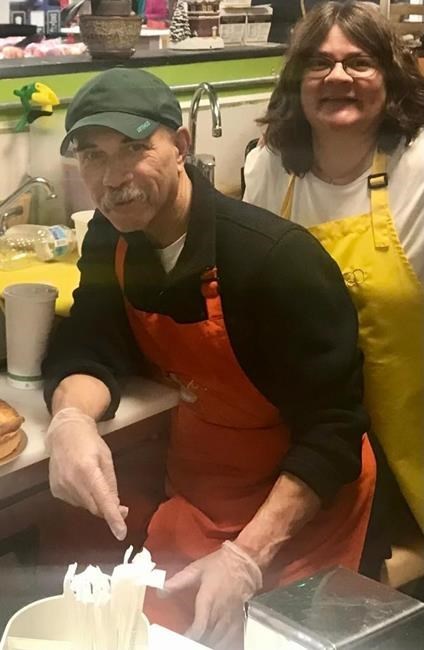EDMONTON — The Venezuelan woman who believes she was used as part of Jason Kenney's argument not to lockdown restaurants in Alberta remembers her encounter with the premier as less dramatic than he suggested.
Carolina De La Torre says Kenney got her central feelings correct, but she said she did not break down into tears the way Kenney recalled.
"No crying," the 57-year-old woman said with a laugh during a phone interview Thursday.
She also said it was Kenney who approached her Calgary food court booth called Arepas Ranch for lunch in October, not the other way around as the premier told it.
After weeks of mounting COVID-19 cases, as more than 1,000 new cases and 16 deaths were reported on Tuesday, Kenney announced new rules that included making indoor private social events illegal.
During the news conference, Kenney gave an example of how much a lockdown would hurt businesses by telling the story of a Venezuelan refugee he met.
"A couple of weeks ago, I was in my constituency, at a little food court thing and a new Albertan, a refugee from Venezuela socialism, came up to me," Kenney said.
"She had just opened a little food kiosk, she recognized me, she came up to me, and she broke down in tears in front of me saying, 'sir, I put my entire life savings as a refugee into this business, we're struggling to pay the bills, if you shut me down, I'm going to lose it all, everything, and I'll be in abject poverty.'"
"For some, perhaps, it is a little bit too easy to say just flick a switch. Shut them down," Kenney said.
"I would ask people who have the certainty of a paycheque to think for a moment about those individuals whose entire life savings are tied up in businesses."
De La Torre and her husband run the booth, which is located a 10-minute drive from Kenney's constituency office.
Born in Venezuela, De La Torre said she and her husband came to Canada with refugee status in 1989 when it became no longer safe to live there. They settled in Montreal for 25 years before they packed their bags and moved to Calgary to follow their daughter who was starting school at the University of Alberta.
They have been living in Alberta for seven years and have been running Arepas Ranch for two years. They are known for making specialty arepas, which is a cornmeal patty, filled with a choice of shredded beef, chicken salad, black beans, ham, cheese, or other vegan and veggie options.
At first, De La Torre said she didn't recognize Kenney when he stopped to order food and then someone from another booth told her it was the premier.
De La Torre doesn't recall exactly what Kenney ordered, but she remembers the "very short" conversation they had when he came back to let them know the meal was "fantastico." She posted a picture of the premier on her Instagram.
De La Torre said Kenney got her feelings right.
She said it’s true that the couple put their money into the business and closing the economy would be bad for them. But she understands it’s about people’s health, which is what she told Kenney.
"What I said is, 'There has to be a balance between the economy and the health. There is not only me in this food court, we are more than 40 small businesses in the court that need to be open to make a way of life'."
No one from Kenney's office immediately responded to a request for comment.
De La Torre said when she heard Kenney mentioned her during a news conference, she was at first surprised.
But now, "I didn't know what to think about it," she said.
"I don't know. What can I say? It's OK."
This report by The Canadian Press was first published Nov. 26, 2020.
This story was produced with the financial assistance of the Facebook and Canadian Press News Fellowship
Fakiha Baig, The Canadian Press




